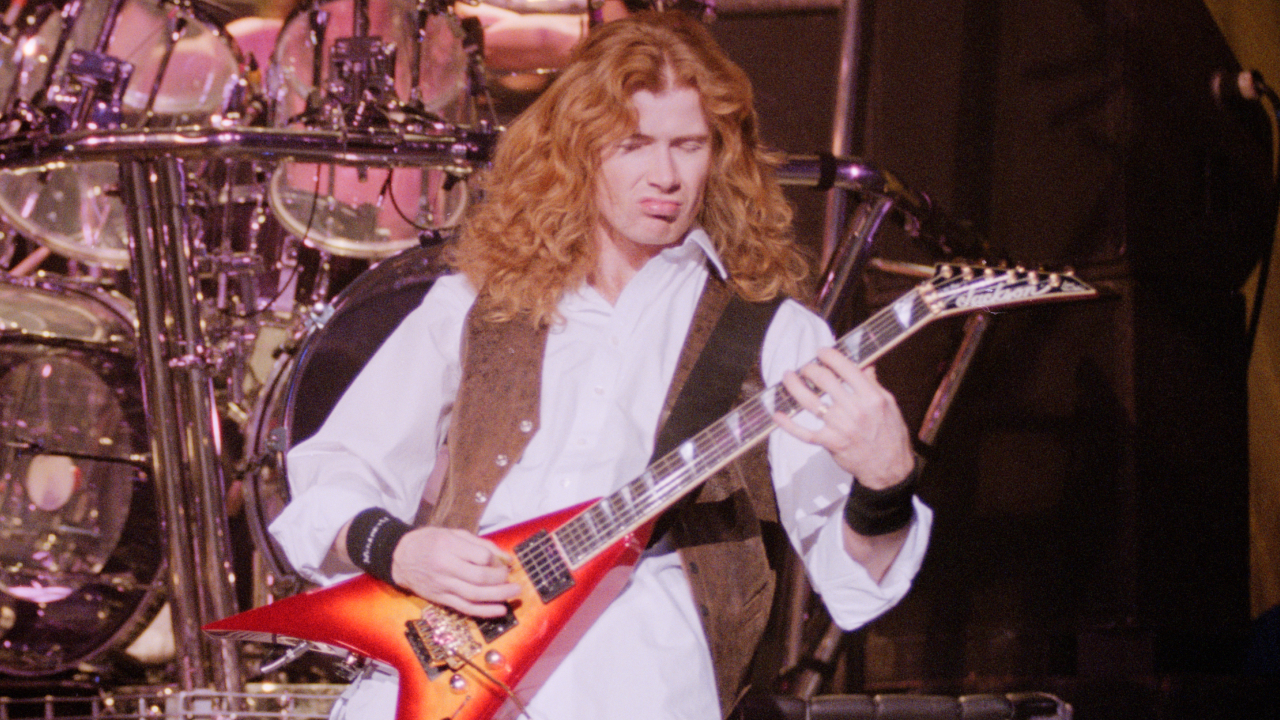Fun fact: riffs make everything better. And few bands have contributed more to the world’s riff supply over the last four decades than Megadeth. Rightly acknowledged as one of metal’s principal architects, Dave Mustaine has penned many of the biggest guitar-powered anthems available to human ears, starting with his early days in Metallica and blossoming into the venomous and technically dazzling bombast of his current band.
Frankly, picking the best riffs from a catalogue of such distinction is a mug’s game – but it’s one we are more than happy to play. Here are the 10 best Megadeth riffs ever. Probably.

Mechanix (Killing Is My Business… And Business Is Good, 1985)
Dave is often cited as the inventor of thrash metal as we know it, and the opening riff to Mechanix is solid proof. As every good metalhead knows, this is also the opening riff of Metallica’s The Four Horsemen, albeit in rhythmically distinct form. Mechanix is a faster and nastier song than its Kill ’Em All counterpart, though, and a decent indicator of exactly how pissed off MegaDave was when he formed his own retaliatory force.
Devils Island (Peace Sells… But Who’s Buying?, 1986)
Riff connoisseurs are spoilt for choice when it comes to Megadeth’s seminal second album, Peace Sells… But Who’s Buying?. The bass riff at the start of the title track, courtesy of a recently dismissed David Ellefson, is undeniably iconic. Similarly, that blistering guitar part toward the end of Bad Omen is an absolute beast, but it’s overshadowed by the rampaging, pitch-black chorus riff from Devils Island. Few things encapsulate Megadeth’s refined but still-evolving thrash better.
In My Darkest Hour (So Far, So Good… So What!, 1988)
Despite So Far, So Good… So What! being largely defined by its snottiness and hostile sonic values, Megadeth managed one moment of heart-rending grandeur and subtlety. In My Darkest Hour begins with an ornate, melancholy and bombastic introductory riff that sums up the poignant purpose of the song before Dave even sings a word. The six-minute tour-de-force that follows is still one of Megadeth’s most revered tunes ever – quite rightly.
Tornado Of Souls (Rust In Peace, 1990)
Here’s another riff that bridges the gap between savage thrash metal and virtuoso showboating. Tornado Of Souls’ nimble-fingered opening was as inventive and enthralling as metal got back in that particular day. The rest of the song is a blizzard of brain-spinning solos and Iron Maiden-esque harmonised hooks, but it’s that initial, edgy and fluid guitar line that loudly proclaimed that the thrash ante was being vigorously upped.
Holy Wars… The Punishment Due (Rust In Peace, 1990)
Megadeth were always the most technical of the Big Four, and by 1990 they were operating on an entirely different level to their peers. Rust In Peace brought utmost technicality and precision to thrash, and the galloping riff that drives the first half of Holy Wars… along was the perfect way to blow the competition away. The second half of the song boasts a much slower and uglier riff that is nearly as good, but there’s nothing like the sustained explosion that goes off after that nimble, brutish drum intro. Metal perfection.
Symphony Of Destruction (Countdown To Extinction, 1992)
There are plenty of complex and technically demanding riffs in the Megadeth catalogue, but the band have never been afraid to go for the jugular with some good old-fashioned simplicity, either. Custom-designed to make heads bang, Symphony Of Destruction’s main verse riff genuinely oozes tension and sounds like the forward march of marauding robots. It’s also catchy as fuck and the perfect, razor-chug backdrop for Dave’s snarled lyrics.
She-Wolf (Cryptic Writings, 1997)
This deep cut from 1997’s Cryptic Writings has been a staple of Megadeth’s live sets for many years now, despite hardly being one of their big, noted anthems. Far be it from us to speculate about Dave’s motivation in this case, but we suspect that She-Wolf makes the cut (a) because that first riff is obviously badass and brilliantly strange, and (b) because Dave bloody says so. We don’t make the rules.
Sleepwalker (United Abominations, 2007)
This is another example of Megadeth keeping it simple to maximise the destruction they can bring. Sleepwalker hinges on a stripped-down, two-note, staccato motif that mutates and becomes more melodic as it builds towards a rowdy conclusion. After a handful of albums that failed to connect like early classics, this track confirmed that Megadeth were back in business – and that business was still good.
Head Crusher (Endgame, 2009)
Still one of the finest metal records of the 21st century, Endgame was so full of great songs that it almost seemed unfair to everybody else. In terms of riffs, it was an avalanche. Pleasingly, the finest ones happen when Megadeth are really sticking the knife in and giving it a twist. Released as a single prior to the full album, Head Crusher starts in full-on berserker mode and hardly lets up for the next three minutes. That first riff is truly wild and seemed to represent renewed passion and intensity in the ’Deth camp.
Night Stalkers (The Sick, The Dying & The Dead, 2022)
Dave is definitely having an excellent time with the current Megadeth line-up. A rampaging deep cut from last year’s The Sick, The Dying & The Dead, Night Stalkers is one of the fastest things the band have done in decades. Both the super-speedy verse guitar parts and the muscular, chopped-up chorus riff are as powerful as anything Megadeth have released in 30 years, too. Dave knows how to write a fucking riff.

